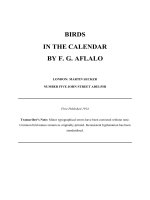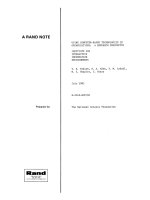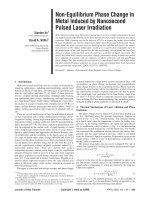Behavior in organizations 10th by greenberg chapter02
Bạn đang xem bản rút gọn của tài liệu. Xem và tải ngay bản đầy đủ của tài liệu tại đây (363.97 KB, 23 trang )
Organizational
Justice, Ethics, and
Corporate
Social Responsibility
Chapter 2
Copyright© 2011 Pearson Education, Inc. Publishing as Prentice Hall
2-1
Learning Objectives
1.
Identify four different forms of organizational
justice and the organizational impact of each.
2.
Describe strategies that can be used to promote
organizational justice.
3.
Explain what is meant by ethical behavior and
why organizations should be concerned about
ethics.
Copyright© 2011 Pearson Education, Inc. Publishing as Prentice Hall
2-2
Learning Objectives
4.
Explain ways of behaving ethically when
conducting business internationally.
5.
Describe the individual and situational factors
responsible for unethical behavior in
organizations and methods for minimizing such
behavior.
6.
Explain what is meant by corporate social
responsibility, the forms it take, and the nature
of the relationship between responsible
behavior and financial profitability.
Copyright© 2011 Pearson Education, Inc. Publishing as Prentice Hall
2-3
Organizational Justice
Copyright© 2011 Pearson Education, Inc. Publishing as Prentice Hall
2-4
Procedural Justice Criteria
Criterion
Description
Example
Voice in the making of
decisions
Perceptions of
procedural justice are
enhanced to the extent
that people are given a
say in the decisions
affecting them.
Workers are given an
opportunity to explain
their feelings about their
own work to a supervisor
who is evaluating their
performance.
Consistency in applying
rules
To be fair, the rules used
as the basis for making a
decision about one
person must be applied
equally to making a
decision about someone
else.
A professor must use the
same exact standards in
evaluating the term
papers of each student
in the class.
Accuracy in use of
information
Fair decisions must be
based on information
that is accurate.
A manager calculating
the amount of overtime
pay a worker is to
receive must add the
numbers accurately.
Copyright© 2011 Pearson Education, Inc. Publishing as Prentice Hall
2-5
Procedural Justice Criteria
Criterion
Description
Example
Opportunity to be
heard
Fair procedures are
ones in which people
have a readily
available opportunity
to correct any mistakes
that have been made.
Litigants have an
opportunity to have a
judge’s decision
reconsidered in the
event that an error was
made in legal
proceedings. (See also
the instant replay rule
used by the NFL as
described in the
Preview Case.)
Safeguards against
bias
A person making a
decision must not have
any opportunity to bias
the results.
Lottery drawings are
held in such a manner
that each number is
selected in a
completely random,
unbiased fashion.
Copyright© 2011 Pearson Education, Inc. Publishing as Prentice Hall
2-6
Distributive and Procedural
Justice Interaction
Copyright© 2011 Pearson Education, Inc. Publishing as Prentice Hall
2-7
Organizational Justice
Promotion Strategies
Pay workers what they deserve
Follow open and fair procedures
Offer workers a voice
•Meet regularly and invite input
•Conduct employee surveys
•Keep an “open door policy”
•Use suggestion system
Copyright© 2011 Pearson Education, Inc. Publishing as Prentice Hall
2-8
Fair Process Effect
Copyright© 2011 Pearson Education, Inc. Publishing as Prentice Hall
2-9
Organizational Justice
Promotion Strategies
Explain decisions thoroughly in a
manner demonstrating dignity and
respect
Train workers to be fair
• Oorganizational citizenship behaviors
Copyright© 2011 Pearson Education, Inc. Publishing as Prentice Hall
2-10
Ethical Behavior in
Organizations
Copyright© 2011 Pearson Education, Inc. Publishing as Prentice Hall
2-11
Bad Ethics Is Bad Business
Copyright© 2011 Pearson Education, Inc. Publishing as Prentice Hall
2-12
Ethics Enforcement Policies
Federal sentencing guidelines
Sarbanes-Oxley act
Limited acceptance of entertainment
and gifts by employees
Increased accurate company
performance documentation standards
Copyright© 2011 Pearson Education, Inc. Publishing as Prentice Hall
2-13
Ethics in International Arena
Copyright© 2011 Pearson Education, Inc. Publishing as Prentice Hall
2-14
Global Ethics Guiding
Principles
Show respect for core human values
Demonstrate sensitivity to local
traditions
Recognize that context matters
Copyright© 2011 Pearson Education, Inc. Publishing as Prentice Hall
2-15
Unethical Behavior Situational
Determinants
Copyright© 2011 Pearson Education, Inc. Publishing as Prentice Hall
2-16
Unethical Behavior
Situational Determinants
Managerial values sometimes
discourage ethical behavior
• Bottom line mentality
• Exploitative mentality
• Madison Avenue mentality
Subordinates emulate managers’
unethical behavior
Copyright© 2011 Pearson Education, Inc. Publishing as Prentice Hall
2-17
Corporate Ethics Programs
Components
Code of ethics
Ethics training
Official bodies formally responsible for
ethics
Mechanisms for communicating ethical
standards
Ethics audits
Copyright© 2011 Pearson Education, Inc. Publishing as Prentice Hall
2-18
Corporate Ethics Programs
Effectiveness
Copyright© 2011 Pearson Education, Inc. Publishing as Prentice Hall
2-19
Corporate Social
Responsibility
Copyright© 2011 Pearson Education, Inc. Publishing as Prentice Hall
2-20
Socially Responsible Behavior
Forms
Make charitable contributions
Preserve the environment
Invest socially responsibly
Promote employee welfare
Copyright© 2011 Pearson Education, Inc. Publishing as Prentice Hall
2-21
Profitability and Social
Responsibility
Copyright© 2011 Pearson Education, Inc. Publishing as Prentice Hall
2-22
This work is protected by United States copyright laws and is provided
solely for
the use of instructors in teaching their courses and assessing student
learning.
Dissemination or sale of any part of this work (including on the World
Wide Web)
will destroy the integrity of the work and is not permitted. The work
and
materials from it should never be made available to students
except by
instructors using the accompanying text in their classes. All
recipients of this work are expected to abide by these restrictions and to honor
the intended pedagogical purposes and the needs of other instructors who rely
All rights reserved. No part of this publication may be reproduced, stored in a
on these materials.
retrieval system, or transmitted, in any form or by any means, electronic,
mechanical, photocopying, recording or otherwise, without the prior written
permission of the publisher. Printed in the United States of America.
Copyright © 2011 Pearson Education, Inc. Publishing as Prentice Hall
2-23









